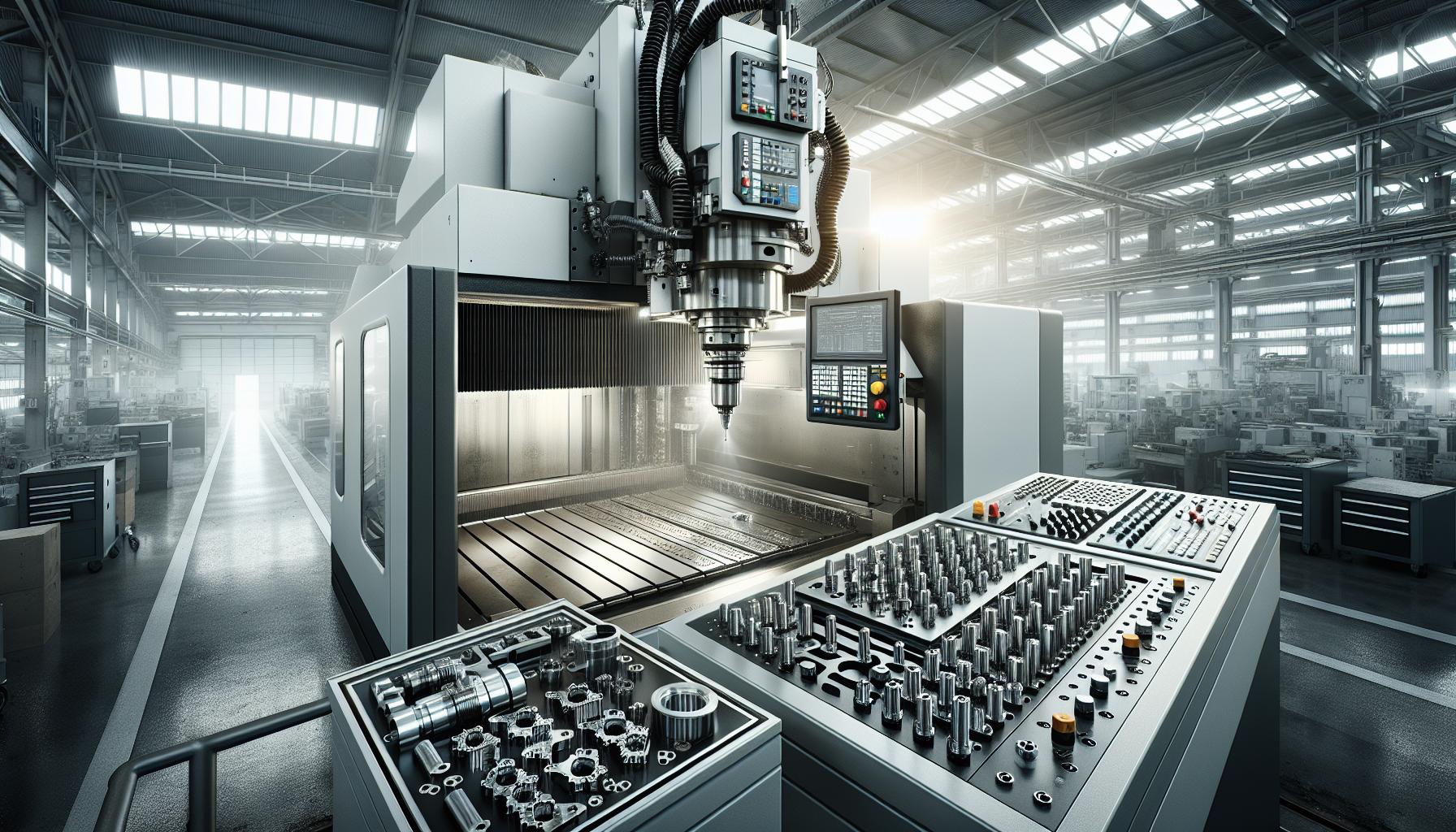CNC machining has revolutionized manufacturing by offering precision and efficiency across various industries. Companies like Yijin Hardware specialize in delivering tailored CNC solutions, including 3-, 4-, and 5-axis machining, to meet the unique demands of sectors such as aerospace, automotive, and medical devices. With their ISO 9001:2015 certification and a commitment to high-quality standards, Yijin Hardware ensures superior results for projects requiring intricate designs and precise specifications.
As businesses strive for competitive advantage, customizing CNC processes to meet specific needs becomes essential. This article explores innovative ways CNC machining can be adapted to improve productivity and ensure industry-specific excellence, with trusted providers like Yijin Hardware leading the way.
Overview of CNC Machining
CNC (Computer Numerical Control) machining automates tool control in manufacturing processes, enhancing precision and efficiency. It utilizes computer systems to execute programmed commands, enabling consistent and accurate production of parts. Typically used in industries like aerospace, automotive, and medical devices, CNC machining produces intricate components with minimal human intervention.
CNC machining encompasses several techniques, including milling, turning, and drilling. These methods allow for the creation of complex shapes and features, catering to diverse manufacturing requirements. Custom tooling, for instance, adapts standard CNC equipment to meet specific project needs, ensuring maximum compatibility with design specifications.
Materials commonly machined using CNC include metals, plastics, and composites. Each material presents unique challenges that can influence the machining process. For example, metals may require specialized tooling to avoid wear, while plastics demand precise temperature control to prevent deformation.
CNC technology supports various configurations, such as vertical and horizontal machining centers. These setups offer flexibility in production, allowing businesses to adjust operations based on design changes or different volume requirements. Advanced options, like multi-axis machining, expand capabilities, allowing for more intricate designs and improved efficiency.
CNC machining provides a robust framework for manufacturing, with the potential for extensive customization. Adapting CNC processes to specific industry needs plays a crucial role in maximizing productivity and achieving quality standards.
Benefits of Customization

Customization in CNC machining offers significant advantages that improve manufacturing processes. Tailored solutions meet specific industry demands, driving improved outcomes.
Enhanced Precision and Accuracy
Custom CNC machining enables manufacturers to produce components with exceptional precision and accuracy. Advanced settings and tooling options allow for tighter tolerances than standard machining processes. Companies can program CNC machines to execute complex geometries, reducing the margin for error. For instance, aerospace components require precise specifications for safety and performance, making customization a critical factor.
Increased Production Efficiency
Customization boosts production efficiency by streamlining workflows. Tailored machining processes minimize the need for manual adjustments, reducing cycle times. For example, automation in CNC setups allows for faster production runs and quicker changeovers. Additionally, customized tooling ensures tools are optimized for specific materials and designs, further enhancing throughput. This efficiency not only lowers manufacturing costs but also improves delivery timelines, aligning with market demands.
Industry-Specific Applications
CNC machining adapts effectively to meet the demands of specific industries, enhancing precision and efficiency in production processes.
Aerospace Industry
CNC machining plays a critical role in the aerospace industry, where accuracy is paramount. Aerospace components often require tight tolerances and complex geometries. Custom CNC processes ensure that parts like turbine blades and structural components meet stringent safety and performance standards. By utilizing advanced materials, such as titanium and composite materials, manufacturers can achieve lightweight designs without sacrificing strength. Multi-axis machining enhances the capability to create intricate shapes, catering specifically to the needs of aerospace engineering.
Medical Device Manufacturing
Customization in CNC machining is essential for medical device manufacturing, where precision impacts patient safety. Devices like implants, surgical instruments, and diagnostic tools require high accuracy and consistency. CNC machining enables the production of components with intricate details and tight tolerances, crucial for devices that fit within the human body. Biocompatible materials, such as medical-grade polymers and metals, can be precisely machined to ensure safety and compliance with regulatory standards. Custom tooling and process adaptations streamline workflows, facilitating the rapid development of new medical innovations.
Automotive Sector
CNC machining significantly influences the automotive sector by facilitating the production of high-quality parts and components. Customization allows for the machining of engine components, transmission parts, and other critical elements with precise specifications. Manufacturers often employ advanced techniques like automated inspection systems to guarantee part quality, adhering to industry standards for safety and performance. The ability to work with various materials, including aluminum and high-strength steel, allows for innovative designs that improve vehicle performance and efficiency. Tailored CNC processes streamline production, reduce cycle times, and help automotive manufacturers meet market demands effectively.
Techniques for Customization
CNC machining offers numerous techniques to adapt the manufacturing process to specific industry needs. These techniques streamline operations and improve precision, ensuring the final products meet stringent requirements.
Software and Programming Adjustments
Software and programming play a pivotal role in CNC machining customization. Advanced CAD/CAM software allows engineers to create detailed models and generate optimized tool paths. By adjusting parameters such as feed rates, spindle speeds, and cutting depths, manufacturers can tailor processes to material properties and project specifications. Utilizing simulation tools also helps identify potential issues before production, increasing efficiency and reducing waste. An example is implementing algorithms that improve machining strategies for complex geometries, ensuring precise results while minimizing cycle times.
Tooling and Fixture Modifications
Tooling and fixture modifications significantly improve CNC machining’s adaptability. Custom tooling, like specialized cutting tools and inserts, is designed to meet the specific needs of different materials and part specifications. Manufacturers can employ fixture modifications to hold workpieces securely during machining, leading to improved accuracy and repeatability. For instance, using adjustable vices allows flexibility for various part shapes and sizes. Custom fixtures not only optimize production runs but also facilitate faster setups, resulting in reduced downtime.
Conclusion
CNC machining stands as a pivotal solution for industries aiming to improve their manufacturing capabilities. By embracing customization, businesses can effectively meet the unique demands of their sectors. Tailored CNC processes not only improve precision and efficiency but also foster innovation in design and production.
As industries evolve, the need for specialized machining solutions becomes increasingly vital. Customization in CNC machining empowers manufacturers to adapt swiftly to changing market conditions while maintaining high standards of quality. This adaptability ensures that companies remain competitive and responsive to their customers’ needs, driving growth and success in a dynamic landscape.
Frequently Asked Questions
What is CNC machining?
CNC machining stands for Computer Numerical Control machining, a manufacturing process that automates tool control for precise and accurate production of parts. It uses computer software to design and guide machines in performing tasks like milling, turning, and drilling, resulting in complex shapes and features.
How does CNC machining benefit industries like aerospace and automotive?
CNC machining offers exceptional precision and efficiency, which are crucial for aerospace and automotive industries. It allows for the production of components with tight tolerances and complex geometries, enhancing performance and safety. Customization also supports innovative designs that meet specific industry needs.
What are the customization options available in CNC machining?
Customization in CNC machining includes software adjustments, custom tooling, and fixture modifications. Advanced CAD/CAM software helps optimize tool paths, while tailored tooling enhances adaptability and accuracy. These options boost production efficiency and streamline workflows, resulting in higher quality outputs.
Why is customization important in CNC machining?
Customization is essential in CNC machining as it enhances precision, reduces cycle times, and lowers manufacturing costs. Tailored solutions allow for better alignment with specific project requirements, helping manufacturers produce high-quality components that meet industry regulations and standards.
What challenges does CNC machining face with different materials?
CNC machining can encounter challenges when working with various materials, such as metals and plastics. These materials have different machining characteristics, requiring custom tooling and processes. Understanding these challenges is essential for optimizing production and achieving desired results efficiently.
How does multi-axis machining improve CNC capabilities?
Multi-axis machining expands CNC capabilities by allowing tools to operate on multiple axes simultaneously. This flexibility enables the creation of complex shapes and features, improves efficiency, and reduces production time by minimizing the need for multiple setups during machining processes.
What role does CAD/CAM software play in CNC machining?
CAD/CAM software is crucial in CNC machining as it aids in designing parts and generating tool paths for machining operations. It streamlines the process by allowing for real-time adjustments, reducing waste, and enhancing accuracy, ultimately improving overall production efficiency.
How does CNC machining ensure accuracy and precision?
CNC machining ensures accuracy and precision through automated tools that follow precise instructions from computer programs. This eliminates human error, allowing for consistent production of parts with tight tolerances, crucial in industries such as aerospace and medical device manufacturing.
Can CNC machining be used for medical device manufacturing?
Yes, CNC machining is widely used in medical device manufacturing. It ensures high precision in producing implants and surgical instruments, abiding by strict safety and compliance standards. The ability to customize processes also enhances the quality and performance of medical components.
What are the benefits of using CNC machining over traditional methods?
CNC machining offers numerous benefits over traditional methods, including enhanced precision, automated production processes, and reduced manual labor. It allows for the creation of complex designs, shorter cycle times, and lower production costs, making it a preferred choice in modern manufacturing.



